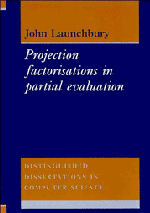Book contents
- Frontmatter
- Abstract
- Contents
- Preface
- 1 Partial Evaluation in Principle
- 2 Partial Evaluation in Practice
- 3 Static Projections
- 4 Binding-Time Analysis
- 5 Run Time Arguments
- 6 Implementation
- 7 Polymorphism
- 8 Conclusion
- A Implementation of PEL
- B Implementation of BTA
- C Implementation of Specialisation
- D Library Functions
- Bibliography
- Index
- Frontmatter
- Abstract
- Contents
- Preface
- 1 Partial Evaluation in Principle
- 2 Partial Evaluation in Practice
- 3 Static Projections
- 4 Binding-Time Analysis
- 5 Run Time Arguments
- 6 Implementation
- 7 Polymorphism
- 8 Conclusion
- A Implementation of PEL
- B Implementation of BTA
- C Implementation of Specialisation
- D Library Functions
- Bibliography
- Index
Summary
There are two almost separate issues to be addressed when we consider polymorphic languages: How to perform polymorphic binding-time analysis, and how to specialise polymorphic functions. We address both here.
Strachey identified two flavours of polymorphism [Str67] which he styled parametric and ad hoc. We will only consider parametric polymorphism, as arises in the widely used Hindley-Milner type system, for example. As ad hoc polymorphism may be reduced to parametric polymorphism by introducing higher-order functions [WB89], this decision is consistent with the thrust of the thesis where we have been considering a first-order language only.
A polymorphic function is a collection of monomorphic instances which, in some sense, behave the same way. Ideally, we would like to take advantage of this uniformity to analyse (and perhaps even specialise) a polymorphic function once, and then to use the result in each instance. Up to now the only work in polymorphic partial evaluation has been by Mogensen [Mog89]. However, with his polymorphic instance analysis each instance of a polymorphic function is analysed independently of the other instances and, as a result, a single function may be analysed many times.
To capture the notion of uniformity across instances Abramsky defined the notion of polymorphic invariance [Abr86]. A property is polymorphically invariant if, when it holds in one instance, it holds in all. Abramsky showed, for example, that a particular strictness analysis was polymorphically invariant. Unfortunately this does not go far enough. Polymorphic invariance guarantees that the result of the analysis of any monomorphic instance of a polymorphic function can be used in all instances, but not that the abstraction of the function can. An example of this distinction appears in [Hug89a].
- Type
- Chapter
- Information
- Project Factorisations in Partial Evaluation , pp. 86 - 106Publisher: Cambridge University PressPrint publication year: 1991

